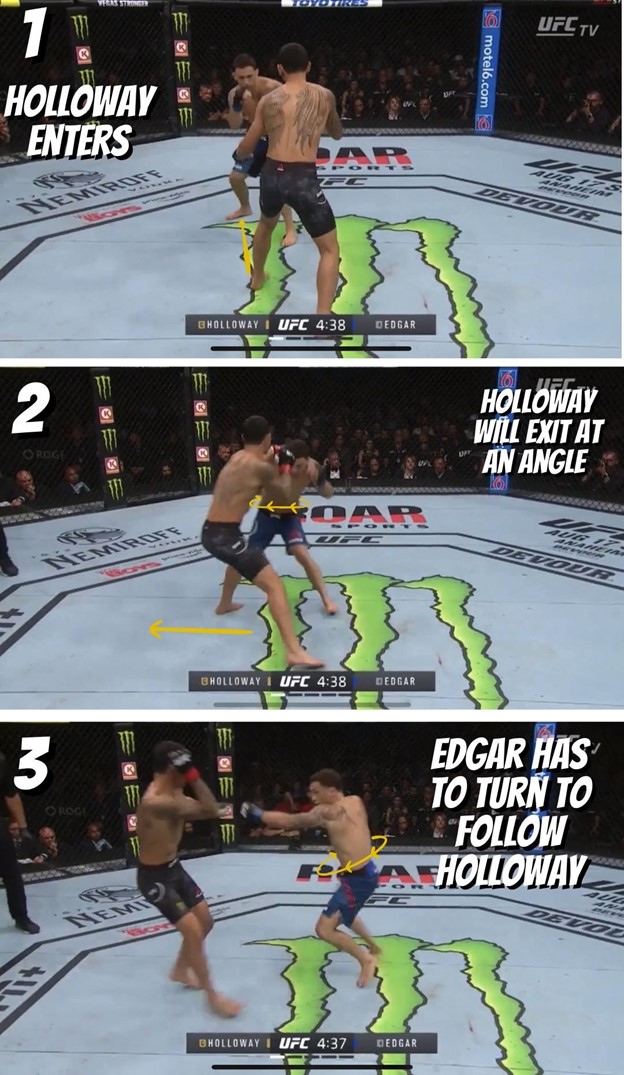
Blaine Henry/Sherdog.com illustration
Defensively Sound
When talking about Holloway, the key to how he fights is his insistence on volume. “Blessed” comes forward at all costs, drowning his helpless opponent with pace, volume and cardio. This makes for a fan-friendly style that doesn’t necessarily bring a multitude of knockouts. In fact, half of the Gracie Technics superstar’s 20 wins have come by way of knockout, but he hasn’t had one since his rematch with Jose Aldo in 2017. Yet fans do not seem to care, and flock to any Holloway fight spoon-fed to them.
Any look into the 31-year-old needs to begin with his footwork. It is the foundation of all of Holloway’s success from the start of his career until now. The ability to avoid takedowns and stay out of harm’s way is what handed Holloway wins over Calvin Kattar, Frankie Edgar and Jose Aldo twice.

Blaine Henry/Sherdog.com illustration
Edgar’s wrestling pedigree makes their fight a good choice for looking at Holloway’s footwork. Early in the fight it was obvious that Holloway wanted to maintain his elusiveness and not give Edgar a chance to get a hold of him. (1) To start the engagement, Holloway enters the pocket with Edgar. Edgar goes to load up on a huge hook and (2) Holloway begins to make his exit. (3) As Holloway exits the exchange, you can see that Edgar has to turn a full 90 degrees to even follow Holloway. This makes a solid punch that much less effective.
While “The Korean Zombie” is not particularly known for his low kicks, the blueprint against Holloway has been to smash the legs early and often, as done by Alexander Volkanovski. I look for Jung to come out and go to the legs a bit more this outing. For Holloway, checking the low kick will be something he wants to keep in the habit of doing. This would discourage Jung, especially if he begins checking them right off the bat, and possibly cause him to abandon the low kick all together, instead opting to try to wrestle against Holloway, which is the Korean’s traditional game plan.
Then we have Holloway’s takedown defense, which is traditionally superb. His career rate of just 16% of takedowns allowed is even more impressive when you consider that Holloway has 27 fights in the UFC. Among his opponents have been Charles Oliveira, Anthony Pettis, Edgar and Volkanovski, all of whom had a vested interest in getting the fight to the ground. Holloway’s anti-wrestling traditionally relies on leaning against the fence and fending off the takedown while supporting himself against the cage. Jung likes to shoot out in the middle of the ring so it will be on Holloway to sprawl or scoot to the cage should Jung get the angle on him and get the fight down.
The Greatest Volume Puncher
After establishing Holloway’s good defensive practices, we must move on to his offense. Punches in bunches is the name of the game for Holloway and many have been drowned in the deep sea of his volume. Holloway consistently runs away with the numbers, reaching 230, 290, and even 445 registered significant strikes in his fights. While one would think that these types of numbers would lead to knockouts, they do not. Instead, Holloway wins fans with his sheer bravado in the cage. He threw down with Ricardo Lamas at the end of the fight he was clearly winning. He taunted the legend Aldo. And everyone will remember “I’m the best boxer in the UFC, baby!” when he battered Calvin Kattar.
This volume may be something that can prove chaos theory correct. Holloway throws so many punches it can seem to the untrained eye like he is just throwing stuff at the wall to see if it sticks, but there is a method to the madness. It all starts with the double jab.
Doubling up on the jab is one of the things Holloway has done that reaps the biggest rewards. After flicking the first jab out, Holloway will either step through to the opposite stance or, in the case of the GIF above, cover extra distance with the second jab. When the second jab is thrown, his opponents usually back straight out or clinch up. Above, it’s leaning straight back which opens up the cross.
Blaine Henry/Sherdog.com illustration
In this annotated screen grab of the previous GIF, we can see where the want to clinch and stay in the pocket will also provide Holloway with a stationary opponent. After the second jab, the opponent will shift his weight to the rear leg instead of circling out or even just exiting to the rear. It allows the cross to be even more effective against an unbalanced opponent while taking power out of their punches to return with.
Another key aspect of Holloway’s game is his bodywork. Going to the body, as longtime readers will remember, is one of my favorite tactics. It brings down the hands and reaps havoc on the cardio of an opponent. This plays perfectly into the game plan of Holloway. Being a volume puncher who likes to outpace his adversaries, body work is a point of emphasis for every Holloway fight.
Kattar is the best example of body work in recent memory for Holloway. With a UFC record 445 significant strikes to account for, it’s easy to find examples of the Hawaiian’s body work there. Getting to the body requires a high guard and often MMA fighters won’t keep one to combat the wrestlers. Lower hands makes you quicker to the beat should a takedown come. The burden for Holloway then becomes: how to get the fighter to adopt a high guard?
Blaine Henry/Sherdog.com illustration
To do this, Holloway builds off the double jab and cross we discussed earlier. As usual, (1) he will step in with the jab to close the distance. The trick here is the expectation of the second jab and cross has been made and Kattar has to raise his raise his guard. But Holloway doesn’t have to throw the second jab. This all goes back to misdirection. If you can build an expectation and break that purposely built pattern, you can find success. Knowing he wants to ultimately poke at the body and seeing that Kattar has his guard pulled high, (2) Holloway throws the cross next instead of the jab. The mechanics behind this are simply the cross loads up the lead hook which (3) Holloway can land down low or up top if he wanted. This time, it was to the body.
In the spirit of breaking expectations, Holloway uses the hook to the body to set up more shots up top. So far, we’ve built on the double jab to cross and brought that down to the body. Now we are going to bring the shot to the body back up top. Forcing Kattar to have such a high guard opens up the body for Holloway. This means when Holloway goes to the body, Kattar must drop his hands to defend the body. He simply can’t win for losing.
Blaine Henry/Sherdog.com illustration
Instead of starting off with the jab, we will (1) start with Holloway slipping the jab to the outside. This protects him from the uppercut and allows him to (2) counter with a jab of his own. This time, (3) Holloway doubles up on the jab, but this time to the body. (4) Kattar must overcompensate and lower his hand down to parry the jab. The issue here: he lowers his left hand for a left jab. Holloway now has the open lane to (5) come up top with the cross.
By mixing up speeds, cadences and combinations, Holloway makes fighting him an absolute nightmare. His alternatives make him so unpredictable that picking up reads on him is nearly impossible, but he isn’t invincible. Being faster than Holloway helps. Power to make him retreat and not look for so many shots is something else Holloway has struggled with, especially against Poirier. The low kick is something he is also susceptible to. Alexander Volkanovski did all three of these. Jung isn’t fast enough. He doesn’t kick enough. But his power is there. Despite that, having all three is what is necessary to beat Holloway. Jung will have to rely on a puncher’s chance.
Quantifying Holloway in a breakdown like this is incredibly complicated and this article is nowhere near the full story. We can dive into his wrestling, stance switching, pacing and so much more on another day, but for now, look at his volume. Look at how he uses his footwork to put “The Korean Zombie” out of position instead of relying on him to do it himself. On Monday, we will look at the Aftermath and learn some more about Holloway.

